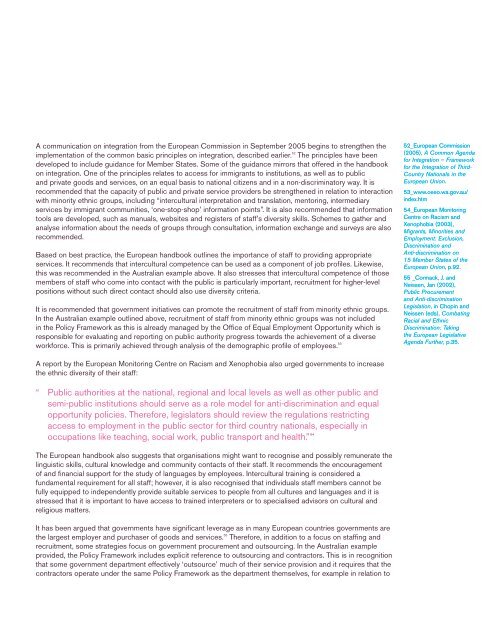improving government service delivery to minority ethnic ... - NCCRI
improving government service delivery to minority ethnic ... - NCCRI
improving government service delivery to minority ethnic ... - NCCRI
Create successful ePaper yourself
Turn your PDF publications into a flip-book with our unique Google optimized e-Paper software.
A communication on integration from the European Commission in September 2005 begins <strong>to</strong> strengthen the<br />
implementation of the common basic principles on integration, described earlier. 52 The principles have been<br />
developed <strong>to</strong> include guidance for Member States. Some of the guidance mirrors that offered in the handbook<br />
on integration. One of the principles relates <strong>to</strong> access for immigrants <strong>to</strong> institutions, as well as <strong>to</strong> public<br />
and private goods and <strong>service</strong>s, on an equal basis <strong>to</strong> national citizens and in a non-discrimina<strong>to</strong>ry way. It is<br />
recommended that the capacity of public and private <strong>service</strong> providers be strengthened in relation <strong>to</strong> interaction<br />
with <strong>minority</strong> <strong>ethnic</strong> groups, including “intercultural interpretation and translation, men<strong>to</strong>ring, intermediary<br />
<strong>service</strong>s by immigrant communities, ‘one-s<strong>to</strong>p-shop’ information points”. It is also recommended that information<br />
<strong>to</strong>ols are developed, such as manuals, websites and registers of staff’s diversity skills. Schemes <strong>to</strong> gather and<br />
analyse information about the needs of groups through consultation, information exchange and surveys are also<br />
recommended.<br />
Based on best practice, the European handbook outlines the importance of staff <strong>to</strong> providing appropriate<br />
<strong>service</strong>s. It recommends that intercultural competence can be used as a component of job profiles. Likewise,<br />
this was recommended in the Australian example above. It also stresses that intercultural competence of those<br />
members of staff who come in<strong>to</strong> contact with the public is particularly important, recruitment for higher-level<br />
positions without such direct contact should also use diversity criteria.<br />
It is recommended that <strong>government</strong> initiatives can promote the recruitment of staff from <strong>minority</strong> <strong>ethnic</strong> groups.<br />
In the Australian example outlined above, recruitment of staff from <strong>minority</strong> <strong>ethnic</strong> groups was not included<br />
in the Policy Framework as this is already managed by the Office of Equal Employment Opportunity which is<br />
responsible for evaluating and reporting on public authority progress <strong>to</strong>wards the achievement of a diverse<br />
workforce. This is primarily achieved through analysis of the demographic profile of employees. 53<br />
52_European Commission<br />
(2005), A Common Agenda<br />
for Integration – Framework<br />
for the Integration of Third-<br />
Country Nationals in the<br />
European Union.<br />
53_www.oeeo.wa.gov.au/<br />
index.htm<br />
54_European Moni<strong>to</strong>ring<br />
Centre on Racism and<br />
Xenophobia (2003),<br />
Migrants, Minorities and<br />
Employment: Exclusion,<br />
Discrimination and<br />
Anti‐discrimination on<br />
15 Member States of the<br />
European Union, p.92.<br />
55 _Cormack, J. and<br />
Neissen, Jan (2002),<br />
Public Procurement<br />
and Anti‐discrimination<br />
Legislation, in Chopin and<br />
Neissen (eds), Combating<br />
Racial and Ethnic<br />
Discrimination: Taking<br />
the European Legislative<br />
Agenda Further, p.35.<br />
A report by the European Moni<strong>to</strong>ring Centre on Racism and Xenophobia also urged <strong>government</strong>s <strong>to</strong> increase<br />
the <strong>ethnic</strong> diversity of their staff:<br />
“ Public authorities at the national, regional and local levels as well as other public and<br />
semi-public institutions should serve as a role model for anti-discrimination and equal<br />
opportunity policies. Therefore, legisla<strong>to</strong>rs should review the regulations restricting<br />
access <strong>to</strong> employment in the public sec<strong>to</strong>r for third country nationals, especially in<br />
occupations like teaching, social work, public transport and health.” 54<br />
The European handbook also suggests that organisations might want <strong>to</strong> recognise and possibly remunerate the<br />
linguistic skills, cultural knowledge and community contacts of their staff. It recommends the encouragement<br />
of and financial support for the study of languages by employees. Intercultural training is considered a<br />
fundamental requirement for all staff; however, it is also recognised that individuals staff members cannot be<br />
fully equipped <strong>to</strong> independently provide suitable <strong>service</strong>s <strong>to</strong> people from all cultures and languages and it is<br />
stressed that it is important <strong>to</strong> have access <strong>to</strong> trained interpreters or <strong>to</strong> specialised advisors on cultural and<br />
religious matters.<br />
It has been argued that <strong>government</strong>s have significant leverage as in many European countries <strong>government</strong>s are<br />
the largest employer and purchaser of goods and <strong>service</strong>s. 55 Therefore, in addition <strong>to</strong> a focus on staffing and<br />
recruitment, some strategies focus on <strong>government</strong> procurement and outsourcing. In the Australian example<br />
provided, the Policy Framework includes explicit reference <strong>to</strong> outsourcing and contrac<strong>to</strong>rs. This is in recognition<br />
that some <strong>government</strong> department effectively ‘outsource’ much of their <strong>service</strong> provision and it requires that the<br />
contrac<strong>to</strong>rs operate under the same Policy Framework as the department themselves, for example in relation <strong>to</strong>
















